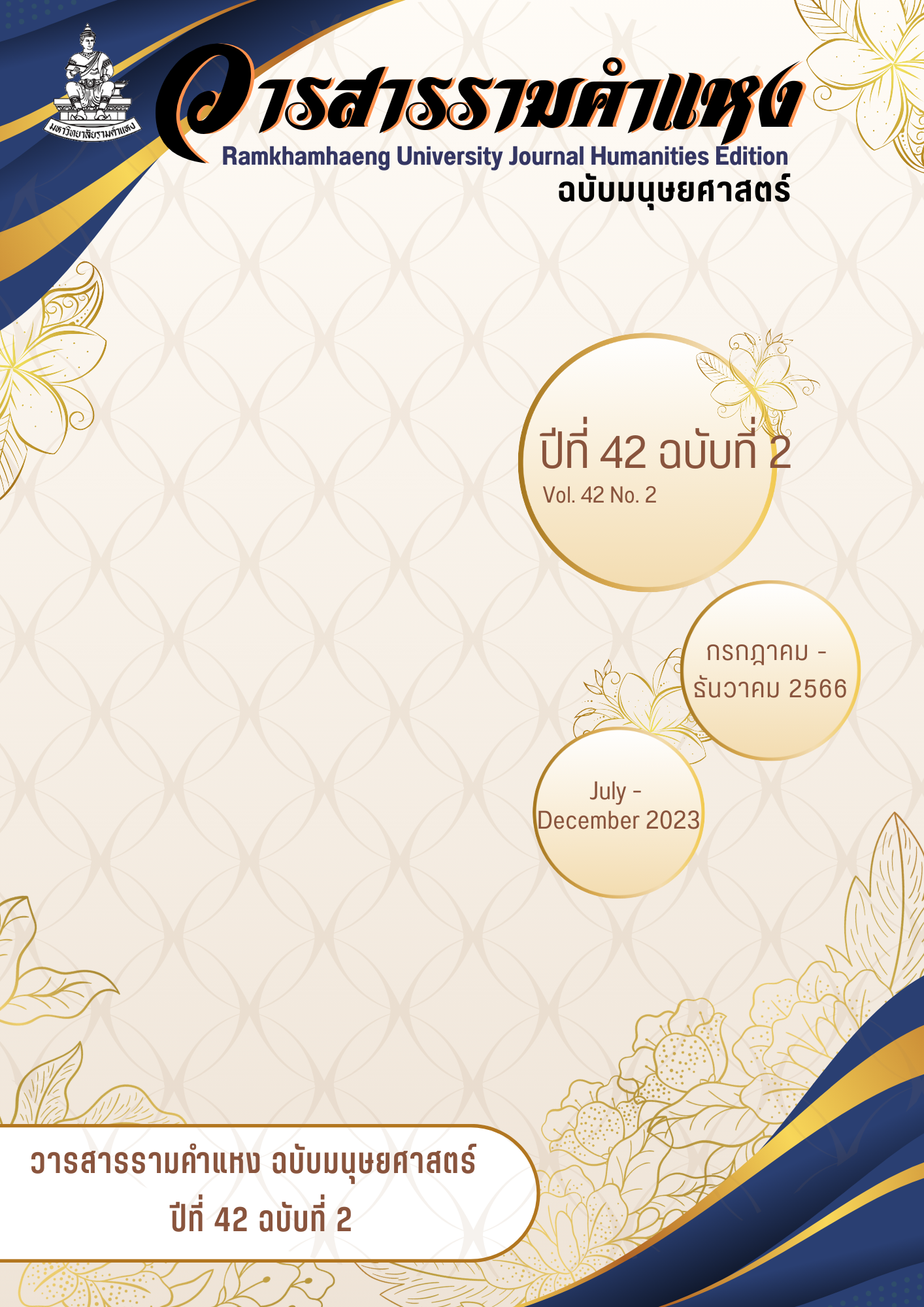ผลของการใช้แบบฝึกเสริมการสื่อสารเพื่อเสริมทักษะการพูดภาษาอังกฤษสำหรับผู้เรียนภาษาอังกฤษในฐานะภาษาต่างประเทศ
Main Article Content
บทคัดย่อ
การศึกษาครั้งนี้มีวัตถุประสงค์ (1) เพื่อศึกษาผลของการใช้แบบฝึกเสริมการสื่อสารเพื่อเสริมทักษะการพูดภาษาอังกฤษ และ (2) เพื่อสำรวจการรับรู้ของนักศึกษาในการใช้แบบฝึกเสริมการสื่อสาร ประชากรประกอบด้วยนักศึกษาวิชาเอกภาษาอังกฤษ จำนวน 38 คน ชั้นปีที่ 1 คณะศิลปศาสตร์ มหาวิทยาลัยเทคโนโลยีราชมงคลตะวันออก เขตพื้นที่จักรพงษภูวนารถ โดยวิธีการเลือกแบบเจาะจง เครื่องมือที่ใช้ ได้แก่ แผนการสอน แบบทดสอบก่อนเรียนและหลังเรียน แบบฝึกเสริมการสื่อสาร แบบการเขียนบทสนทนา แบบสังเกตการสนทนา และแบบวัดการรับรู้ของนักศึกษา ผู้วิจัยวิเคราะห์ข้อมูลโดยใช้เทคนิคสถิติเชิงพรรณนาในรูปของการแจกแจงความถี่ ร้อยละ ค่าเฉลี่ย และส่วนเบี่ยงเบนมาตรฐาน และใช้สถิติ t-test แบบ Dependent Sample ผลการศึกษาพบว่านักศึกษามีผลคะแนนหลังการใช้แบบฝึกเสริมการสื่อสารเพื่อเสริมทักษะการพูดภาษาอังกฤษสูงกว่าอย่างมีนัยสำคัญทางสถิติที่ระดับ .01 ผลการวิเคราะห์จากแบบการเขียนบทสนทนา ซึ่งนักศึกษาสื่อสารด้วยความเข้าใจเป็นส่วนใหญ่ อีกทั้งผลการวิเคราะห์จากแบบสังเกตการสนทนาด้วยกิจกรรมบทบาทสมมติอยู่ในระดับดี ซึ่งนักศึกษาให้ความร่วมมือในกิจกรรมบทบาทสมมติและทำได้อย่างราบรื่น นอกจากนี้นักศึกษายังมีการรับรู้ที่ดีเกี่ยวกับการเรียนการสอนในชั้นเรียนและมีความมั่นใจในการพูดภาษาอังกฤษมากขึ้นโดยใช้กิจกรรมบทบาทสมมติ การศึกษานี้แสดงให้เห็นว่าการฝึกฝนอย่างสม่ำเสมอผ่านกิจกรรมบทบาทสมมติเป็นหลักสำคัญในการเพิ่มความสามารถในการพูดของนักศึกษาและเพิ่มความมั่นใจในการพูด
Article Details

อนุญาตภายใต้เงื่อนไข Creative Commons Attribution-NonCommercial-NoDerivatives 4.0 International License.
ประกาศลิขสิทธิ์จะปรากฏในเกี่ยวกับวารสาร ควรอธิบายสำหรับผู้อ่านและผู้เขียนว่าเจ้าของลิขสิทธิ์เป็นผู้เขียนวารสารหรือบุคคลที่สาม ควรรวมถึงข้อตกลงการอนุญาตเพิ่มเติม (เช่นใบอนุญาตครีเอทีฟคอมมอนส์) ที่ให้สิทธิ์แก่ผู้อ่าน (ดูตัวอย่าง) และควรให้วิธีการรักษาความปลอดภัยหากจำเป็นสำหรับการใช้เนื้อหาของวารสาร
เอกสารอ้างอิง
Abdul Rahman, N. A., & Maarof, N. (2018). The effect of role-play and simulation approach on enhancing ESL oral communication skills. International Journal of Research in English Education, 3(3), 63–71. Retrieved September 3, 2023 from https://doi.org/10.29252/ijree.3.3.63
Afdillah, N, M. (2015). The effectiveness of role play in teaching speaking. Master dissertation, Department of English Education, Faculty of Tarbiyah and Teachers' Training, Hidayatullah State Islamic University, Jakarta. http://repository.uinjkt.ac.id/dspace/handle/123456789/26710 date retrieved on 20-5- 2015
Altun, M. (2015). Using role-play activities to develop speaking skills: A case study in the language classroom. International Journal of Social Sciences & Educational Studies, 1(4), 27–33. Retrieved September 3, 2023 from https://ijsses.tiu.edu.iq/wp-content/uploads/2012/07/vol-1-no-4-2015.pdf#page=27
Angelianawati, L. (2019). Using Drama in EFL Classroom. JET (Journal of English Teaching), 5(2), 125. Retrieved September 3, 2023 from https://doi.org/10.33541/jet.v5i2.106
Barefoot TEFL Teacher. (2023). What is 'Presentation, Practice, Production' (PPP)? Retrieved September 10, 2023 from https://www.barefootteflteacher.com/p/what-is-presentation-practice-production
Boonkit, K. (2010, January). Developing adult EFL students’ speaking abilities: Enhancing the development of speaking skills for non-native speaker of English. Retrieved April 13, 2023 from https://www.researchgate.net/publication/248607406_Enhancing_the_development_of_speaking_skills_for_non-native_speakers_of_English
Brignall, M. (2023). The perception. Retrieved September 3, 2023 from https://www.wisc-online.com/learn/general-education/oral-interpersonal/oic21919/the-perception-process-screencast
Brown, H. D. (2007). Principles of language learning and teaching. Hoboken, NJ: Pearson Education Limited.
Bygate, M. (1993). Speaking. Oxford: Oxford University Press.
Cohen, A. D. (1994). Assessing speaking skills: Assessing language ability in the classroom. Boston: Heinle & Heinle.
Critcher, C. R., & Gilovich, T. (2010). Inferring attitudes from mind wandering. Personality and Social Psychology Bulletin, 36(9), 1255-1266.
Efrizal, D. (2012). Improving Students’ Speaking through Communicative Language Teaching Method at Mts Ja-alhaq, Sentot Ali Basa Islamic Boarding School of Bengkulu, Indonesia. International Journal of Humanities and Social Science, 2(20). 127–134.
Fulcher, G. (2003). Testing second language speaking. Harlow: Pearson Longman.
Inkaew, S. (2023). Assessment in conversation writing. Retrieved April 13, 2023 from https://sites.google.com/a/saschool.ac.th/sp/dlpages/foreigns/evaluation
Ishak, S. A., & Aziz, A. A. (2022). Role play to improve ESL learners’ communication skills: A systematic review. International Journal of Academic Research in Business and Social Sciences, 12(10), 884–892.
Krebt, D. M. (2017). The effectiveness of role play techniques in teaching speaking for EFL College Learners. Journal of Language Teaching and Research, 8(5), 863-870. doi: http://dx.doi.org/10.17507/jltr.0805.04
Little, D., Devitt, S., & Singleton, D. (1989). Learning foreign languages from authentic texts: Theory and practice. Dublin: Authentik in association with CILT.
Littlewood, W. (1995). Communicative language teaching. Cambridge: Cambridge University Press.
Luan, S., & Angkana, S. (2000). Assessment of affective domain. Bangkok: Suweeriyasan.
Maier, H. W. (2002). Role playing: structures and educational objectives. CYC-online, eJournal of the International Child and Youth Care Network (CYC-Net), 36. www.cyc-net.org/cyconline/cycol-0102-roleplay.htmal
Mark, B. U. (2020). Students’ speaking motivation and their perspectives on a task-based language classroom: pedagogical implications. The Journal of Asia TEFL, 17(2), 681-688.
Oberle, A.P. (2004). Understanding public land management through role-playing. Journal of Geography, 103(5), 199-210.
Panduangkaew, Rosesamon. (2012). A study of effective communication in English by using pair-work activity at Wiangsa-Ardpittayakhom School. Unpublished master’s thesis, Ramkhamhaeng University, Bangkok.
Paulston, C. B. (1978). Teaching English as a second language: Techniques and procedures. New York: Winthrop.
Qing, X. (2011). Role play – An effective approach to developing overall communicative competence.
Rahman, A., Yassi, A. H., & Arafah, B. (2016). The Use of Role-play to Improve Teaching Speaking. International Journal of Scientific and Research Publication, 6(3), 239– 241.
Rao, D., & Stupans, I. (2012). Exploring the potential of role-play in higher education: Development of a typology and teacher guidelines. Innovations in Education and Teaching International, 49(4), 427-436. doi: 10.1080/14703297.2012.728879
Reddy, S. (2016, April). Importance of English language in today’s world. International Journal of Academic Research, 4(2), 179-184.
Richards, J. C. 2008. Teaching listening and speaking from theory to practice. Cambridge: Cambridge University Press.
Russell, C., & Shepherd, J. (2010). Online role-play environments for higher education. British Journal of Educational Technology, 41(6), 992–1002. https://doi.org/10.1111/j.1467-8535.2009.01048.x
Shangeetha, R. K. (2017). Benefits and shortcomings of role-play as a speaking activity in English language classrooms. The English Teacher, XXXIX, 72-93. https://journals.melta.org.my/index.php/tet/article/view/273
Siahaan, S. (2008). Issues in Linguistics. Yogyakarta: Graha Ilmu.
Togimin, N., & Jaafar, H. (2020). Role play activities: an innovative approach to teaching speaking skills in an ESL classroom. LSP International Journal, 7(2), 19–36. Retrieved August 30, 2023 from https://doi.org/10.11113/lspi.v7.16310
Vani, R., Mohan, S., & Ramkumar, E. V. (2022). A study on ameliorating Indian engineering students’ communication skills in relation with CEFR. Theory and Practice in Language Studies, 12(6), 1172-1180. Retrieved August 30, 2023 from https://doi.org/10.17507/tpls.1206.17
Wang, Q. (2006). English pedagogy course. Beijing: Higher Education Press.


